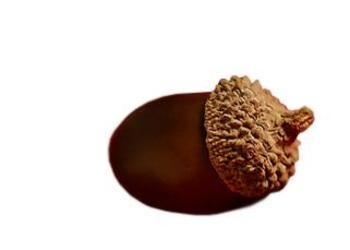Acceptable Offering

Confession: I'm a bit of a perfectionist. And there is nothing like the spring holy day season--Passover, the Days of Unleavened Bread, examining where I fall short still--to make me realize how imperfect I am. I end up identifying with the words of Isaiah: "But we are all like an unclean thing, and all our righteousness are like filthy rags; we all fade as a leaf, and our iniquities, like the wind, have taken us away" (Isaiah 64:6). After all, I think, when I look at what I do, it's imperfect. Wrong things, wrong timing, wrong reasons, unthinking... selfish. Even my most perfect deeds are usually marred in some way, even to my too human eye. How in the world can I ever please God's perfect standard?
A small gift leads to understanding
I found myself thinking about this, and then my eye fell on my computer at work. Stuck to the flat surface is an acorn, its top split open a tiny bit. It is adhered to the computer with blue poster putty. It is not even really a thing of beauty, and it causes constant questions from students. It gets in the way of my papers and is in constant peril of being jarred from its position, and yet it remains. Why? Because it was a gift from a student. She brought it in one morning, cupped in her very small hand, and presented it to me. "Mrs. Rowland, I brought this for you."
The student has since moved to a new school, but her gift remains, a reminder that imperfect gifts can be perfect. Why is it special? Her attitude mostly; that she had found something, carried it carefully, and thought of me the whole way. That she had given it because she wanted me to have it. Even though it is somewhat less than beautiful to my eyes, to my heart it is a wonderful thing.
The gift that she brought reminds me that it is our hearts that God wants. Yes, deeds are important: they are a natural outgrowth of what is happening inside. If there are no deeds to be seen, we ought to question what is in our hearts. But God is interested in what is happening inside.
God cares deeply about our hearts and minds
David records, "For You do not desire sacrifice, or else I would give it; You do not delight in burnt offering. The sacrifices of God are a broken spirit, a broken and a contrite heart— These, O God, You will not despise" (Psalms 51:16-17).
And in 2 Corinthians 9:6-8, Paul writes, "But this I say: He who sows sparingly will also reap sparingly, and he who sows bountifully will also reap bountifully. So, let each one give as he purposes in his heart, not grudgingly or of necessity; for God loves a cheerful giver. And God is able to make all grace abound toward you, that you, always having all sufficiency in all things, may have an abundance for every good work."
What is our ultimate offering? It is our whole life our whole attitude, and our whole heart. In Romans 12:1-2, Paul writes, "I beseech you therefore, brethren, by the mercies of God, that you present your bodies a living sacrifice, holy, acceptable to God, which is your reasonable service. And do not be conformed to this world, but be transformed by the renewing of your mind, that you may prove what is that good and acceptable and perfect will of God."
When my student gave me that ragged acorn, my love for her made her earnest and well-meant gift acceptable. When we present our deeds and our hearts to God, His love for us makes our less-than-perfect offerings acceptable, and He will respond by blessing us with the capacity to do more, to do better, as we grow in grace and knowledge. It is not a perfect deed that He seeks, but rather the earnest desire to achieve perfection in heart and the decision to give all we have to His way of life. Whatever then we offer in the course of our life, let it be offered without obligation and with the recognition that it is not our gift that is acceptable, but rather God's love for us rendering us--and our gifts--acceptable offerings.
To learn more about giving your life as an acceptable offering to God, read the Bible study aid Transforming Your Life: The Process of Conversion.
